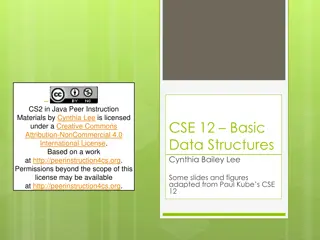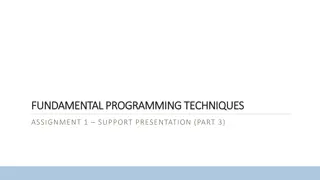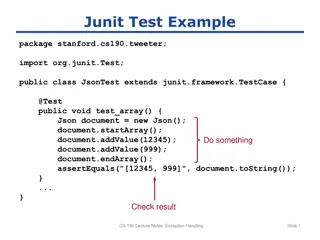
Master JUnit Testing in Java with Examples
Learn how to effectively use JUnit for unit testing in Java, covering topics such as writing test cases, setup and teardown methods, assertions, handling exceptions, timeouts, and more. Improve the quality of your code by mastering JUnit testing techniques.
Download Presentation

Please find below an Image/Link to download the presentation.
The content on the website is provided AS IS for your information and personal use only. It may not be sold, licensed, or shared on other websites without obtaining consent from the author. If you encounter any issues during the download, it is possible that the publisher has removed the file from their server.
You are allowed to download the files provided on this website for personal or commercial use, subject to the condition that they are used lawfully. All files are the property of their respective owners.
The content on the website is provided AS IS for your information and personal use only. It may not be sold, licensed, or shared on other websites without obtaining consent from the author.
E N D
Presentation Transcript
Unit Testing Procedural Programming Functions Object Oriented Programming Classes, Interfaces, Functions White Box Testing! If there is a change, testing will notify if it is erroneus
Junit Unit Testing Library in Java https://github.com/junit-team/junit4/wiki/Download-and-Install With Maven With Nothing (Download the jar files, specify them as library, use it) Write @Test before each method
Before After //execute before test @Before public void before() { System.out.println("in before"); } Executed before each test in class //execute after test @After public void after() { System.out.println("in after"); }
Before After Class //execute before test @BeforeClass public void before() { System.out.println("in before"); } //execute after test @AfterClass public void after() { System.out.println("in after"); } Executed before only once
fail() Nice command to fail your test automatically Why do we need that? If exception is thrown, we may need to fail!
assertEquals @Test public void addTest(){ Calculator c=new Calculator(); int output=c.add(3, 4); assertEquals(7,output); }
Timeout Test @Test (timeout = 2000) public void infloopTest(){ Calculator c=new Calculator(); c.infloop(); } It creates an error not failure!
assert(Not)Null @Test public void getDoubleTest(){ Calculator c=new Calculator(); Double d=c.getDouble(-1); //if null then success else failure assertNull(d); }
assertTrue/False Public void someTest(){ String str= Someval ; boolean check=Calculator.getLengthEqualZero(str); assertTrue(check); }
assert(Not)Same int num1=4; int num2=4 assertSame(num1,num2); //they will be same //Check if two object references not point to the same object assertNotSame(num1,num2); == is used for comparison whereas assertEquals() uses equals(Obj)
TestSuite Create a collection of tests and run them together Right Click on the package of test and New>Other> Test Suite Select the tests to be added to that test Suite
package com.java.something; import org.junit.runner.RunWith; import org.junit.runners.Suite; import org.junit.runners.Suite.SuiteClasses; @RunWith(Suite.class) @SuiteClasses({ AddTest.class,OpsTest.class, SubtractTest.class }) public class AllTests { }
Results as a report? You can get XML report Or write some code to parse them import org.junit.runner.JUnitCore; import org.junit.runner.Result; import org.junit.runner.notification.Failure; public class TestRunner2 { public static void main(String[] args) { Result result = JUnitCore.runClasses(TestAssertions.class); for (Failure failure : result.getFailures()) { System.out.println(failure.toString()); } System.out.println(result.wasSuccessful()); } Resource: https://www.tutorialspoint.com/junit/junit_quick_guide.htm }
Demo Time! See this link for a quick code examples https://www.tutorialspoint.com/junit/junit_using_assertion.htm Code and these slides are in the QR Code or in the link below https://app.box.com/s/smyhc0i2nqgn8b63i4rsu2rlftd6p4ec Prepared by: Salih Safa BACANLI bacanli@knights.ucf.edu













